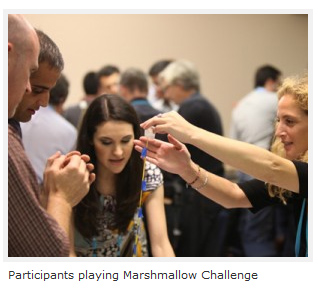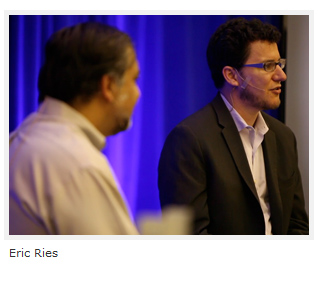 By Brian Hoffstein
By Brian Hoffstein
Contributing Writer, Singularity University.
What can children teach MBAs about winning the innovation game? How is the new science of entrepreneurship transforming business as usual in Silicon Valley and around the startup - and non-startup - world? After this exciting interview with Eric Ries, author of The Lean Startup, we'll show what kindergarteners beating b-school grads teaches us about the mindset needed to bootstrap success as an entrepreneur.
Ries recently joined the team at Singularity University as the Entrepreneurship track chair to bolster the organization's mission of incubating businesses and organizations that can positively impact a billion people. He sat down with Vivek Wadhwa to discuss how his ideas can be applied to Singularity University's grand-scale, high-tech ventures.
Back to the marshmallow challenge, an 18-minute exercise where groups compete to build the tallest freestanding structure they can from 20 spaghetti sticks, a yard each of tape and string, and a marshmallow. The only rule is that the marshmallow must sit on top. How hard can this be? Unexpectedly hard, depending on who plays. While the average group manages about 20 inches, b-school grads average less than half that, while kindergarteners rise above to 26 inches, nearly three times the b-school average.

How does this apply to innovation and your business? Deconstructing the elements of success, the kids won, not by planning to build, but by building and failing, repeatedly - each experiment teaching them what it takes to keep the marshmallow standing. Teamwork, risk taking, prototyping and resilience: these are the pillars of success, and the kids handled these dynamics better than the MBAs. Innovation through less planning and more doing outmatched traditional business-model schools of thought, and this mode has become a best practice strategy in Silicon Valley and innovation hubs around the world.
One implementation of this strategy is referred to as the lean startup movement, and its methodology has become what many call a science of entrepreneurship. Eric Ries constructed the game plan in his book The Lean Startup. His premise: start with a testable hypothesis - where your idea is possible and can be built, and customers will want what you build - and then test it with the least effort possible. This least effort product, known as the Minimum Viable Product (or MVP), validates the hypothesis using the least amount of resources you can. The goal is to quickly verify that people are interested in what you plan to create, before you sink your time, energy and money in creating it. The MVP isn't perfect, in fact, Ries likes to say that if you're not embarrassed by the first version of your product then you've waited too long.
Build, then build again, says Ries. Move from the MVP into a series of iterations that slowly but surely guide the business forward, staying honest with what he calls innovation accounting. This delineates the key metrics to measure a product's growth and ensure you're on the right track: if the math doesn't work, iterate again. All in all, the entire system - from the idea's inception to its manifestation - should take no longer than the time it takes an MBA to write a business plan. It is this idea of rapid prototyping and flexibility in the plan (as demonstrated by our fearless youth in the marshmallow challenge) that yields the greatest chance for success.
And in an age of rapidly advancing technologies, being lean may be even more important. Technologies that are information enabled (computing, biology, even solar technologies) can speed up in a Moore's Law like fashion, according to Ray Kurzweil's Law of Accelerating Returns. These greater speeds make for an increasingly competitive and volatile environment, and embedding agility in your business, being able to iterate and pivot when necessary, may be the difference between bonus and bankruptcy.

If business environments are changing this quickly, then lean principles to rapidly adapt could be a strategy to test at any scale, from Fortune 500 companies to startups and local shops. Exponential trends empower you to experiment, prototype, and do a lot with a little. High speed computing, global connectivity, cloud computing and 3D Printing provide you - or your competitors - with an innovator's toolkit that barely existed just a decade ago. With widespread access to data and the ability to get feedback in real time, a lean business is in tune with potential opportunities and resilient in the face of disruption. All of these developments have sparked an evolution in the business frontier - and only the lean will survive.
Visit X PRIZE at xprize.org, follow us on Facebook, Twitter and Google+, and get our Newsletter to stay informed.
This material published courtesy of Singularity University.